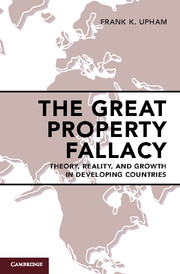Book contents
- Frontmatter
- Dedication
- Contents
- Preface
- Acknowledgments
- 1 Introduction
- 2 Physics Envy: Property Rights in Development Theory
- 3 Property and Markets: England and America
- 4 Property and Politics: Japan
- 5 Law and Development without the Law Part: China
- 6 Theory in Action: Cambodia
- 7 Property Rights and Social Change
- Index
6 - Theory in Action: Cambodia
Published online by Cambridge University Press: 19 January 2018
- Frontmatter
- Dedication
- Contents
- Preface
- Acknowledgments
- 1 Introduction
- 2 Physics Envy: Property Rights in Development Theory
- 3 Property and Markets: England and America
- 4 Property and Politics: Japan
- 5 Law and Development without the Law Part: China
- 6 Theory in Action: Cambodia
- 7 Property Rights and Social Change
- Index
Summary
In studying the relevance of contemporary property theory to developing countries we have seen three examples of the strong presence of formal law – economically driven in England and America, politically driven in Japan – and a powerful example of its absence in China. In this chapter, we examine the post-Khmer Rouge reconstruction of Cambodian property rights, specifically the 2001 Land Law, where formal law again plays the central role, but with a significant difference: courts remain in the background and legislation plays the key function in destroying and recreating property rights.
Because of its official status as one of the World Bank's least developed countries and its extreme dependence on the international community for technical, administrative, and financial support, Cambodian legal reform embodies development practitioners' aspirations for property law to a degree unusual even in small poor countries. The Law was initiated, drafted, and financed by foreign experts determined to create a legal regime that would put into practice the wisdom of neo-institutional economics as interpreted and applied by the World Bank and an alphabet soup – the ADB, CIDA, JICA, DANIDA, and GIZ – of other international aid agencies. Because the law is as close as one is likely to get to a pure application of social science theory to practice, an examination of its creation and implementation can further deepen our understanding – and elucidate the complexity – of the role of property rights in development. Specifically, it will allow us to assess the extent to which a system that offers clear, transparent, and conclusive title to land can deliver on its promises of growth and development.
Cambodia provides this opportunity because unlike the English, American, and Chinese examples, the transformation of its property rights regime was neither the product of domestic political forces nor a spontaneous, incremental response by market players to economic forces. Instead, like the Japanese land reform, it was an intentional decision by outsiders to improve the law, although in this instance with the primary goal of accelerating economic growth rather than creating democracy. In contrast to postwar Japan, however, where domestic political forces quickly captured the process, Cambodia's successive waves of foreign experts remained in control. They not only designed the relevant statutes but also funded and oversaw the building of the bureaucracies charged with their implementation.
- Type
- Chapter
- Information
- The Great Property FallacyTheory, Reality, and Growth in Developing Countries, pp. 106 - 130Publisher: Cambridge University PressPrint publication year: 2018



